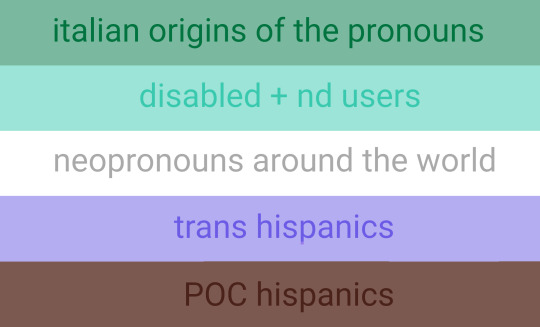#ectopronouns coining
Explore tagged Tumblr posts
Text
I recently coined the term "ectopronoun" to describe pronouns that already exist being used in different languages / being used in a new way (like they/them being used for singular people, or it/its being used for people instead of just objects or animals in English), so pay / paykuna would fall into this category, and fall under the neopronoun umbrella!
if non-hispanics reblogged it would help a ton!
so, i've been noticing lately that english speakers that don't support neopronouns have been saying stuff like "neopronouns are for americans, no one else uses neopronouns in other languages! they're confusing to non-natives!" and it honestly upsets me SO MUCH, because that's simply not true! neopronouns exist all around the world, and i'm here to speak for hispanic neopronoun users as an argentine myself.
spanish has neopronouns, hispanics use neopronouns! it's not debatable!
spanish does not have an equivalent to they/them, "someone dropped their wallet, if i find them i'll give it back to them" would be "a alguien se le cayó su billetera, si lo encuentro se la devolveré" (someone dropped his wallet, if i find him i'll give it back to him).
so, since there's many non-binary people that felt like they needed a gender-neutral pronoun for themselves, elle/le was invented as opposed to él/lo.
as you may know, a neopronoun is a pronoun that is not official to a language (although some neopronouns may become official), and since elle/le is not official to spanish, it's a neopronoun to us.
and no, this isn't our only neopronoun.
we have others such as elli/li, ellu/lu, il/li, etc. that do not have a translation to english, kinda like how xe/xem, ze/zir, ae/aer, etc. do not have a translation to spanish.
and yes, these are actually used, and not only online: i've had many friends in my country that used these pronouns among nounself pronouns (a friend that used él/ella/elli/quack, another one that used elle/ella, etc.)
so, i've made an il/li/-i pronoun flag!
il/li are pronouns derived from italian, and they're one of the most common neopronouns around here!


[ID: On the left, there's flag with 5 stripes all of the same size, the colors of these stripes from top to bottom are: mint green, turquoise, white, light purple, and brown. The image on the right is the same flag with the color-meanings of each stripe, and from top to bottom, these are the meanings: Mint green - italian origins of the pronouns, Turquoise - disabled and neurodivergent users, White - neopronouns around the world, Light purple - trans hispanics, and Brown - people of color hispanics. End ID]
this is the flag with its meanings, any hispanic / spanish-speaker that IDs with these pronouns is free to use it!
14K notes
·
View notes
Note
I recently coined a few more terms for more specific categories of neopronouns! :)
It/its falls into the neopronoun category of ectopronouns, for pronouns that already exist and are used, but are not typically used in the language being spoken for people!
"It" is already an established pronoun in English, but it's new to being used for people as a chosen pronoun rather than a derogatory term, so it's an ectopronoun!
Here's the post!
Is there a specific term for it/it's? I've been looking but couldn't find a direct answer. :/
Hey!
It/it’s usually fall under neopronouns. There’s lots of information about neopronouns online, so hopefully knowing the term will help with your search 😊
-Rosie
6 notes
·
View notes